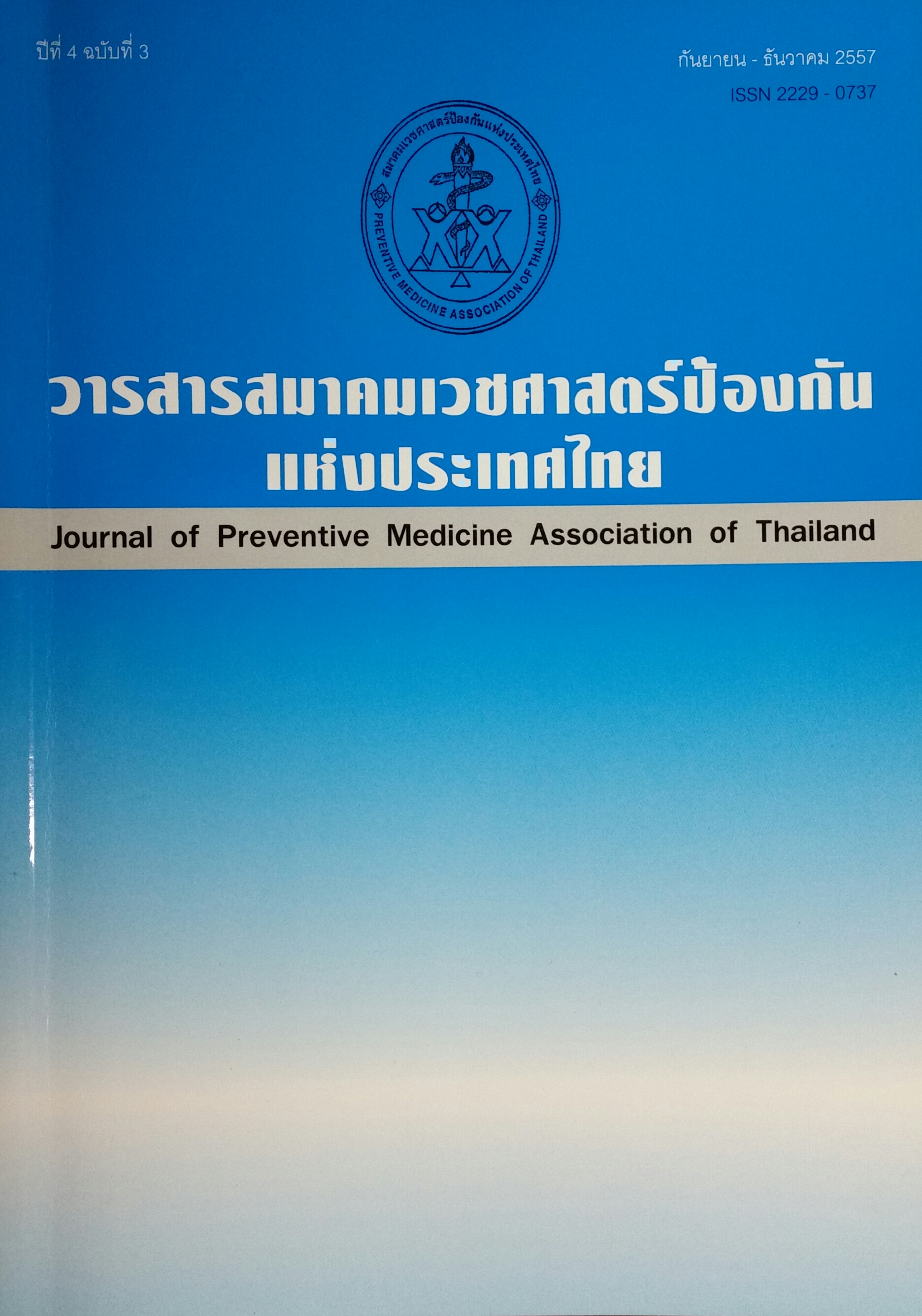The Effect of Counseling Program Applying Motivational Interviewing Technique and Health Belief Model on Weight Loss Behavior of the Employees of Quality Construction Products Co., Ltd. (Thailand)
Keywords:
Counseling Program, Weight Loss Behavior, Health Belief Model, Metabolic Syndrome Behaviors, Motivational Interviewing CounselingAbstract
This quasi-experimental research was conducted to study the effect of counseling program applying motivational interviewing technique and health belief model on weight loss behavior of the employees of Quality Construction Products Co., Ltd. (Thailand). The study samples were 20 employees who work in Phra Nakhon Si Ayutthaya. The participants had received counseling program which consisted of 3 activities. Questionnaires were applied for data collection.
Percentage, mean, standard deviation, One Way Analysis of Variance with Repeated Measures were applied for data analysis. The results revealed that: 1) After receiving the counseling program, perceived susceptibility of obesity, perceived severity of obesity, perceived benefit of obesity prevention and health motivation of the employees were statistically significant increased but their perceived barrier was not different from before receiving the counseling program.
2) After receiving the counseling program, weight loss behavior of the employees was statistically significant increased but their body weight was not different from before receiving the counseling program.
References
2. ชัยชาญ ดีโรจนวงค์. Metabolic syndrome. วารสารหมอชาวบ้าน, 2550;276(10):11-17.
3. สง่า ดามาพงษ์. คู่มือคนไทย ขยับกับ กิน. กรุงเทพฯ: องค์การสงเคราะห์ ทหารผ่านศึก. 2550.
4. วิชัย เอกพลากร. บรรณาธิการ. การสำรวจสุขภาพประชาชนไทยโดยการตรวจร่างกายครั้งที่ 4 พ.ศ.2551-2. นนทบุรี: บริษัทเดอะกราฟฟิโก ซิสเต็มส์ จำกัด.2553.
5. กรมอนามัย, กองโภชนาการ. สถานการณ์โรคอ้วนในประเทศไทย 2550. (Online). (วันที่ค้นข้อมูล 1 มกราคม 2556) แหล่งข้อมูล : URL: http://advisor.anamai.moph.go.th.
6. โรงพยาบาลพระนครศรีอยุธยา, กลุ่มงานสุขศึกษา. เอกสารรายงานประจำปี 2553. พระนครศรีอยุธยา : โรงพยาบาลพระนครศรีอยุธยา. 2554.
7. Marshall Becker and Maiman. “The Health Belief Model and Personal Health Behavior”. Health Education Monographs. 1975:2(4):12. (Online). (cited 2010 January 31). Available From : URL : http://www.chcr.umich.edu/health.theories.com
8. Prochaska and Diclemente. Motivational Interviewing Procedure and Stages of Change. 1991. (online). (cited 2010 January 31). Available From: URL : http://www.motivationalinterview.org/
9. อนันต์ ไชยกุลวัฒนา และ ชัยสิทธิ์ สุนทรา. ผลของโปรแกรมสุขศึกษาเพื่อพัฒนาการรู้เท่าทันสื่อโฆษณาผลิตภัณฑ์เสริมอาหาร ลดน้ำหนัก ในกลุ่มตัวอย่างนักเรียนหญิงชั้นมัธยมศึกษา ภาคตะวันออกเฉียงเหนือ ศรีนครินทร์เวชสาร 2554;26(1):25-34.
10. รัตนา ยอดพรหมมินทร์ และ เกศแก้ว สอนดี. ผลของโปรแกรมสร้างพลัง โดยประยุกต์แบบแผนความเชื่อด้านสุขภาพในการส่งเสริมพฤติกรรมการป้องกันโรคหลอดเลือดสมอง ในประชาชนกลุ่มเสี่ยง อำเภอเมือง จังหวัดสระบุรี. วารสารพยาบาลสาธารณสุข 2554;25(20):79-89.
11. ปาริฉัตร พงษ์หาร, จรรจา สนตยากร, ปกรณ์ ประจัญบาน. วิโรจน์ วรรณภิระ. ผลของโปรแกรมการสร้างเสริมสุขภาพต่อพฤติกรรมการป้องกันอาการอ้วนลงพุงของอาสาสมัครสาธารณสุข. วารสารการพยาบาลและสุขภาพ 2011;5(3):54-64.
12. ญาตา แก่นเผือก, สุวรรณา จันทร์ประเสริฐ, วรรณิภา อัศวชัยสุวิกรม. ผลลัพธ์ของการกำกับตนเองในการรับประทานอาหารและ การเดินเร็วเพื่อควบคุมน้ำหนักของหญิงที่มีน้ำหนักเกิน. วารสารสาธารณสุขมหาวิทยาลัยบูรพา 2014;9(1):105-116.
13. ทัตติยา นครไชย. ผลของโปรแกรมการปรับเปลี่ยนพฤติกรรมและการกำกับตนเอง ในการลดน้ำหนักของพนักงานหญิงที่มีสภาวะอ้วน. วิทยานิพนธ์ปริญญาวิทยาศาสตร์มหาบัณฑิต (การพยาบาลสาธารณสุข). บัณฑิตวิทยาลัย. กรุงเทพ : มหาวิทยาลัยมหิดล, 2554.
14. Melanson KJ, Summers A, Nguyen V, Brosnahan J, Lowndes J, Angelopoulos TJ, Rippe JM. Body composition, dietary composition, and components of metabolic syndrome in over weight and obese adults after a12-week trial on dietary treatments focused on portion control, energy density, or glycemic index. Nutrition Journal. 2012;(21):11:57.
Downloads
Published
How to Cite
Issue
Section
License
บทความที่ลงพิมพ์ในวารสารเวชศาสตร์ป้องกันแห่งประเทศไทย ถือเป็นผลงานวิชาการ งานวิจัย วิเคราะห์ วิจารณ์ เป็นความเห็นส่วนตัวของผู้นิพนธ์ กองบรรณาธิการไม่จำเป็นต้องเห็นด้วยเสมอไปและผู้นิพนธ์จะต้องรับผิดชอบต่อบทความของตนเอง






